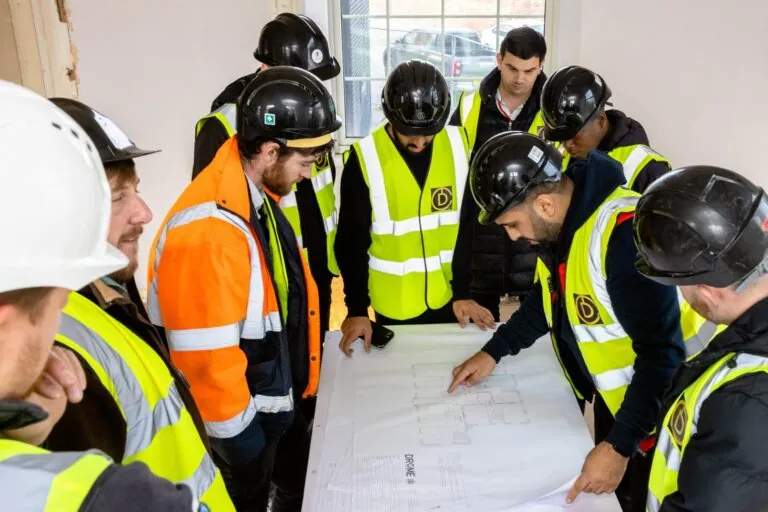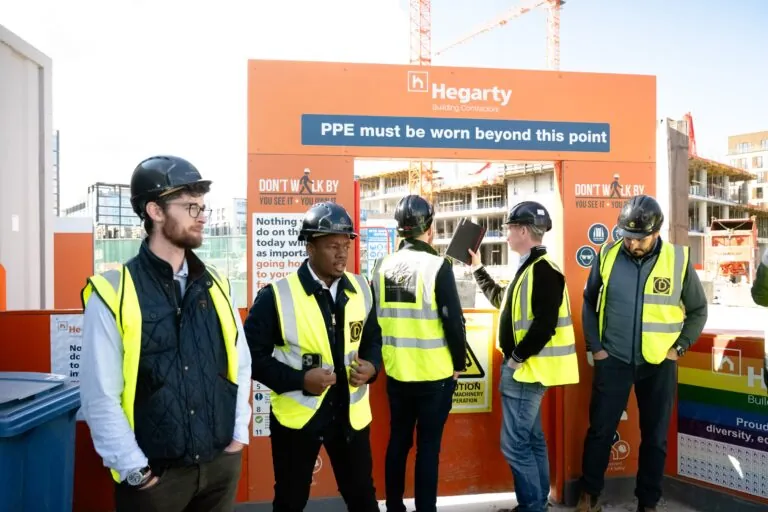So, you want to be a construction manager? Good choice. It’s a career that’s as rewarding as it is challenging. You get to call the shots, oversee massive projects, and – let’s be real – wear a hard hat with authority. But how do you actually get there?
Maybe you’re a tradie with some on-site experience behind you, but you’re unsure how to make the career jump into more responsibility. Perhaps you’ve never even stepped foot on a construction site but can see yourself overseeing jobs and managing teams.
The only thing that’s certain, is there is no one single way to get there. It all depends on you, and whether or not you have the drive, determination, and skills to pull it off.
I’ve been in construction for over 15 years, and have managed a wide range of jobs, from single designer homes, to multi-million dollar masterplans. I’ve had to elbow my way up the ladder to get to where I am today, and I can share a thing or two about what did (and did not) help me get there.
Let’s break it down, step by step.
What This Article Covers:
- Get Your Hands Dirty
- What Credentials Do You Need To Be a Construction Manager?
- Develop Leadership and Communication Skills
- Master the Art of Budgeting and Scheduling
- Stay Updated with Industry Trends
- Tracking and Managing Labor Time: Get a Handle on your Team
- Build Your Reputation and Network
- Aim High – Be Ambitious
- Final Thoughts
Get Your Hands Dirty
If you don’t know what it’s like to break a sweat shifting plasterboard, mixing cement, or loading a skip, you’ll forever be at a disadvantage when you try to tell someone else to. Construction sites are greased by the currency of respect, and construction workers are in general, very proud people.
Think about it, if you’re someone who spends your working life putting up with everything from the cold rain in winter, to sunburn and heat stroke in the summer, you don’t just do it for the money – you also do it because you care, and you want to work alongside others that care too.
If you’ve not so much as dirtied your hands unloading a van, you’re going to struggle to gain respect from the guys on site.
Some of the most successful construction managers and foremen I know started as carpenters, bricklayers, or laborers. They know what it’s like to put in a 12-hour shift on a Sunday because the concrete trucks are coming on Monday and the shuttering needs to be ready. Therefore, the team now working underneath them understand that they know what it’s like to put in a days graft.
But hey, you don’t have to learn a trade if you want to get your foot in the door. There are also academic routes into construction that can be just as successful. If this is you, however, my advice would be to find a three-month window after or during your studies, phone a construction recruitment agency, and put yourself forward as a laborer. The things you’ll learn from spending time on-site will pay dividends throughout your career.
In today’s world of shiny-faced graduates, It’s more important than ever to be able to stand out, and serving some time on the field will do just that.

What Credentials Do You Need To Be a Construction Manager?
While some construction managers climb the ranks by gaining experience, in today’s world, there is nearly always an academic element of some sort attached. Whereas a construction degree can be helpful, it isn’t necessary, and there are lots of other options to choose from.
You can study construction diplomas, short courses, or other vocational qualifications that can all help you broaden your understanding of construction, and demonstrate to your employer that you are serious about your career.
If I had a dollar for every time I was approached by someone wanting a promotion into management, I would perhaps be able to afford some Festool drill or two! But in all seriousness, in reality, not everyone can get the promotion, and whereas having qualifications against your name may not be the deciding factor, it does demonstrate that you have technical competence and a commitment to the industry.
Certificates don’t have to be degree or diploma-based, there are also a handful of industry-specific certificates that can give you a competitive edge. Some common certificates worth considering include the following:
- Certified Construction Manager (CCM) – Offered by the Construction Management Association of America (CMAA), this is great for proving your expertise.
- Project Management Professional (PMP) – A common go-to training program and certificate geared towards high-level project management.
- OSHA Safety Certification – A health and safety qualification that will serve any construction site well.
Develop Leadership and Communication Skills
Managing a construction site is more than just giving orders. You’re the bridge between architects, engineers, workers, and clients. That means you need to develop strong people and communication skills. One misinterpreted instruction can lead to delays, budget overruns, or worse – an angry scaffolder!
You also need to get comfortable with conflict resolution, which is no simple task. When tensions rise (and they will), you’ll be the one keeping everyone focused and productive. Leadership is about balancing authority with respect, so learn to keep a level head, and listen more than you talk.
Master the Art of Budgeting and Scheduling
Construction managers are essentially project managers with a hard hat and muddy boots. You need to balance tight budgets, strict deadlines, and unexpected setbacks. Understanding cost estimation, procurement, and scheduling processes is crucial.
These days, this mostly takes place digitally on popular construction management software such as Procore, Coins, and Microsoft Project. Learn them. Use them. There is an unlimited source of free learning materials online just a Google search away, so make the most of it.
Learning the tools of the trade will not only impress prospective employers but will allow you to hit the ground running when you do get into your new management role.
Stay Updated with Industry Trends
Contrary to popular belief, the construction industry isn’t stuck in the Stone Age. From sustainable building materials to AI-driven project management tools, staying updated with new tech and methods will keep you ahead of the curve.
Joining industry organizations like the Associated General Contractors of America (AGC) or becoming chartered through the Chartered Institute of Building (CIOB) will help keep you in the loop with the latest developments.
Not only will you become a member of a like-minded family of peers and professionals, but you will also get access to leading resources and support to help you in your career development.
And don’t forget: network, network, network! Attend construction expos, trade shows, and training days to keep close to the fire, and connect with fellow construction enthusiasts and thought leaders. You never know who you might meet, and where that can take your career.
Tracking and Managing Labor Time: Get a Handle on your Team.
Let me tell you now, one of the biggest headaches you will consistently encounter in any construction management role is managing teams. In my own career, I have often thought that I’m not just a construction manager, I’m a parent, a therapist, a friend, and about 50 other relationship-driven roles.
Getting a grip on how to handle teams effectively and efficiently will be one of the first skill sets you will have to develop.
In my view, the simpler the better, and I have learned to lean on digital solutions such as time tracking apps that allow you to automate overseeing and recording workers’ hours, timesheets, and locations.
By using such tools, you are removing the margin for error, elevating pressure from your own workload, and making life easier for the team – nobody enjoys filling out paper timesheets on a rainy Friday afternoon.
It’s no secret that the construction industry is fraught with disputes and arguments, and the best defense is black-and-white records. By having a papertrail (even better if it’s digital) of what has occurred on site, will prepare you for resolving disputes that may arise, before they have even happened. As they say, failing to prepare, is preparing to fail.
Build Your Reputation and Network
Now you’ve got some experience and credentials behind you, it’s time to build a name for yourself. Construction is an industry where word of mouth matters. The number of times the phrase “you’re only as good as your last job” is used in construction is a testament to how true the sentiment is. After all, cliché’s are cliché’s for a reason.
If you start to become known as a person who’s reliable, trustworthy, and competent, it won’t be long until you have more career options than you know what to do with. One of the great benefits of working in the construction industry is just how in demand it is. If you build a solid reputation, you’ll never be out of work.
Deliver projects on time, stay professional, and maintain good relationships with clients and subcontractors.
Now some of you may cringe at the idea, but for those that really want to push themselves, think about building your online profile to reflect the progress you’re making in your career. Social media isn’t just for influencers – LinkedIn and industry forums are great places to connect with other professionals, show off your work, and discover new job opportunities.

Aim High – Be Ambitious
I remember sitting down for lunch with one of my early mentors in construction, one of the directors of Turner & Townsend. He told me that one of his regrets was not being more ambitious in his career. I found this odd advice from someone in such a high-level role, however, it did make me think,
Once you’re comfortable as a construction manager, why stop there?
Many construction managers move into executive roles, start their own construction firms, or become consultants. The sky’s the limit, and it’s worth every now and then to stop and check in with yourself, your career goals, and ensure that you are moving in a direction that resonates with your personal and professional aspirations.
Aiming high doesn’t necessarily mean wanting to be CEO of the company. It can also mean working towards a role that allows you to travel. It might be to go work in a particular sector of the industry that you find interesting. It may mean to give back and work in a charitable or socially driven role.
There are so many places that a career in construction can take you, and don’t feel that anything is out of reach – the world is your oyster, and the more you push yourself, the more chance you have of achieving your ambitions.
Final Thoughts
The path to becoming a construction manager isn’t one-size-fits-all. Whether you start as a laborer working your way up, or take an academic route, success in this industry boils down to experience, persistence, and a willingness to keep learning.
Respect is earned through hard work, leadership is developed through challenges, and skills are sharpened by staying ahead of the curve. Keep networking, keep improving, and most importantly – keep building. Whether you’re managing a small renovation or a multi-million-dollar development, every project is a stepping stone to another opportunity.
So, put on that hard hat, embrace the hustle, and go build something great.



